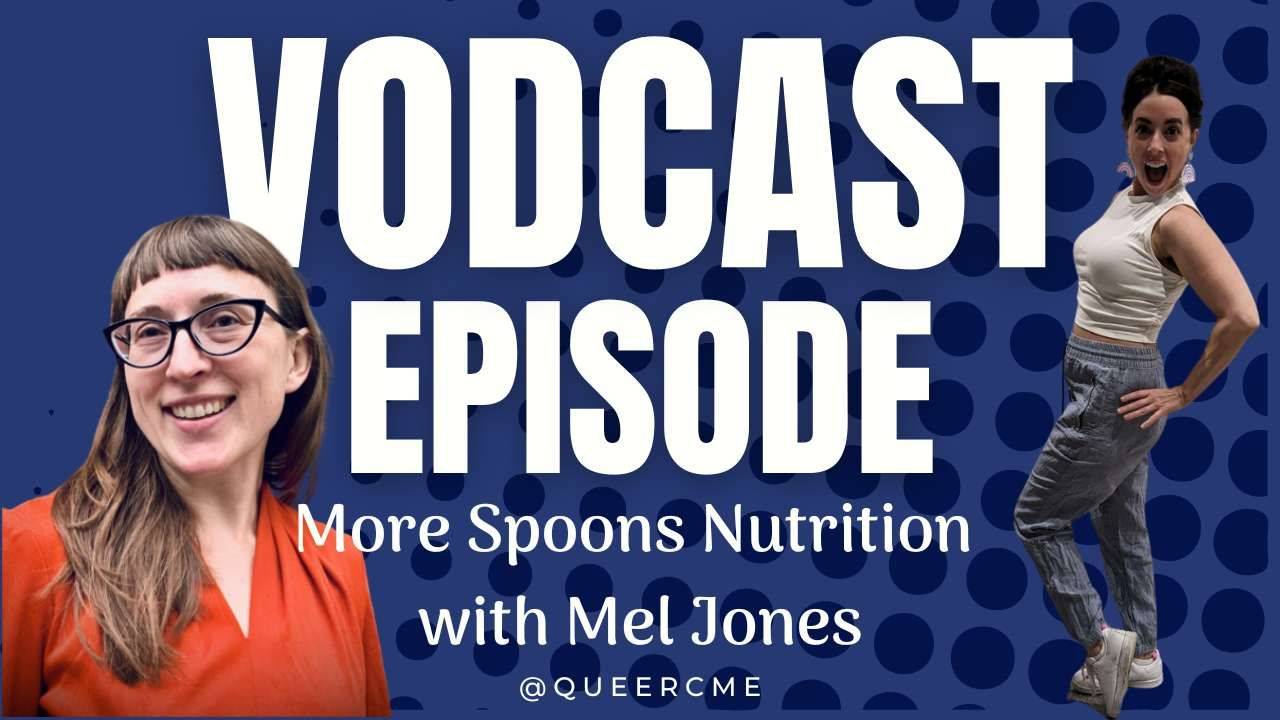New Vodcast Episode: Centering Dietitians in Gender Affirming Care with Mel Jones (More Spoons Nutrition)
Oct 06, 2025
We are thrilled to share the newest QueerCME vodcast episode, featuring Melinda “Mel” Jones, MPAS, RDN (she/they) of More Spoons Nutrition. In this rich conversation, Dr. Crystal Beal and Mel explore the vital — and often underappreciated — role of dietitians in gender affirming care.
Who Is Mel Jones & What’s More Spoons Nutrition?
Mel Jones leads a body-positive, neurodiversity-affirming, LGBTQIA+ inclusive integrative nutrition practice. Drawing on over 13 years of clinical experience bridging medical and nutrition care, Mel founded More Spoons in part as a response to the limitations they observed in traditional nutrition paradigms — especially for people with complex conditions and intersecting identities. Their work is rooted in honoring each person’s embodied experience and building supports that align with each individual’s sensory, emotional, and nutritional needs.
Mel holds credentials as a Registered Dietitian Nutritionist (RDN) and completed advanced training in integrative and functional nutrition. They also have lived experience as a neurodivergent person managing chronic illness, which deeply informs their relational, trauma-aware approach to nutrition care.
Why Dietitians Matter in Gender Affirming Care
In the vodcast, Mel and Dr. Beal surface several critical principles and opportunities for dietitians working with transgender and gender diverse people (TGD). Below is a distilled thread of insights — with citation of relevant literature — to guide clinicians, dietitians, and multidisciplinary teams.
1. Nutrition is not neutral — it intersects with cultural, identity, and body politics
Nutrition counseling in cis-normative frameworks often assumes a “healthy ideal” rooted in narrow aesthetics, weight‑normative metrics, and control. For TGD folks who carry body dysphoria, history of eating distress, or internalized fatphobia, such approaches can cause harm. Mel highlights how dietitians must pivot from “fix-the-body” models to offerings rooted in community, autonomy, dignity, and co-created goals.
2. Hormone Therapy & Physiology = Nutrition Implications
Gender affirming hormone therapy (GAHT) can shift metabolism, body composition, lipid profiles, insulin sensitivity, bone density, and cardiovascular risk. Nutrition planning must account for these changing physiologies — not simply replicate cisgender norms. For example, energy needs may change; fat distribution shifts; baseline lab values may need reinterpretation.
3. Disordered Eating & Eating Disorders Are Elevated, Yet Under-Screened
Research notes that transgender and gender diverse populations show higher prevalence of disordered eating behaviors, as a coping tool tied to gender dysphoria, weight manipulation to influence secondary sex characteristics, or control in contexts of systemic stress. Yet many clinics and care teams lack routine screening, especially in gender-affirming settings. Mel underscores the necessity of sensitive, gender-aware screening and integrative collaboration with behavioral health, medical, and nutrition care.
4. The Therapeutic Relationship and Language Matter
An affirming dietitian does more than “give a meal plan.” The relational container — how questions are asked, how food goals are co-created, how bodily change is framed — can communicate respect, power, and safety (or its opposite). Mel and Dr. Beal discuss how focusing on adding things, giving space for clients’ embodied wisdom, and honoring their priorities (rather than imposing one-size-fits-all ideals) makes a difference in outcomes and trust.
For Clinicians, Dietitians & Allied Health Colleagues
If you’re a dietitian (or an aspiring one), this episode is an invitation: to deepen your trans health literacy, reflect critically on your assumptions about health and body, and align your clinic to support autonomy and justice. If you’re a primary care clinician, endocrinologist, or mental health provider, listening to this conversation gives you richer insight into what your TGD patients may need — and how to better collaborate with dietitians in their care.
You might also want to explore:
- Sabrina String's Fearing the Black Body
- Da'Shaun Harrison's The Belly of the Beast
- Dalai Knisey's Decolonizing Wellness
- The Association for Size Diversity and Health
- FedUp Collective
- Nutrition Guidance for Transgender and Gender Diverse Individuals
SUBSCRIBE FOR MONTHLY UPDATES
QueerCME distriputes a monthly newsletter which details our content updates. We also offer free live stream didactic sessions on topics in gender affirming healthcare, so we send out reminders around those as well.
We hate SPAM. We will never sell your information, for any reason.

